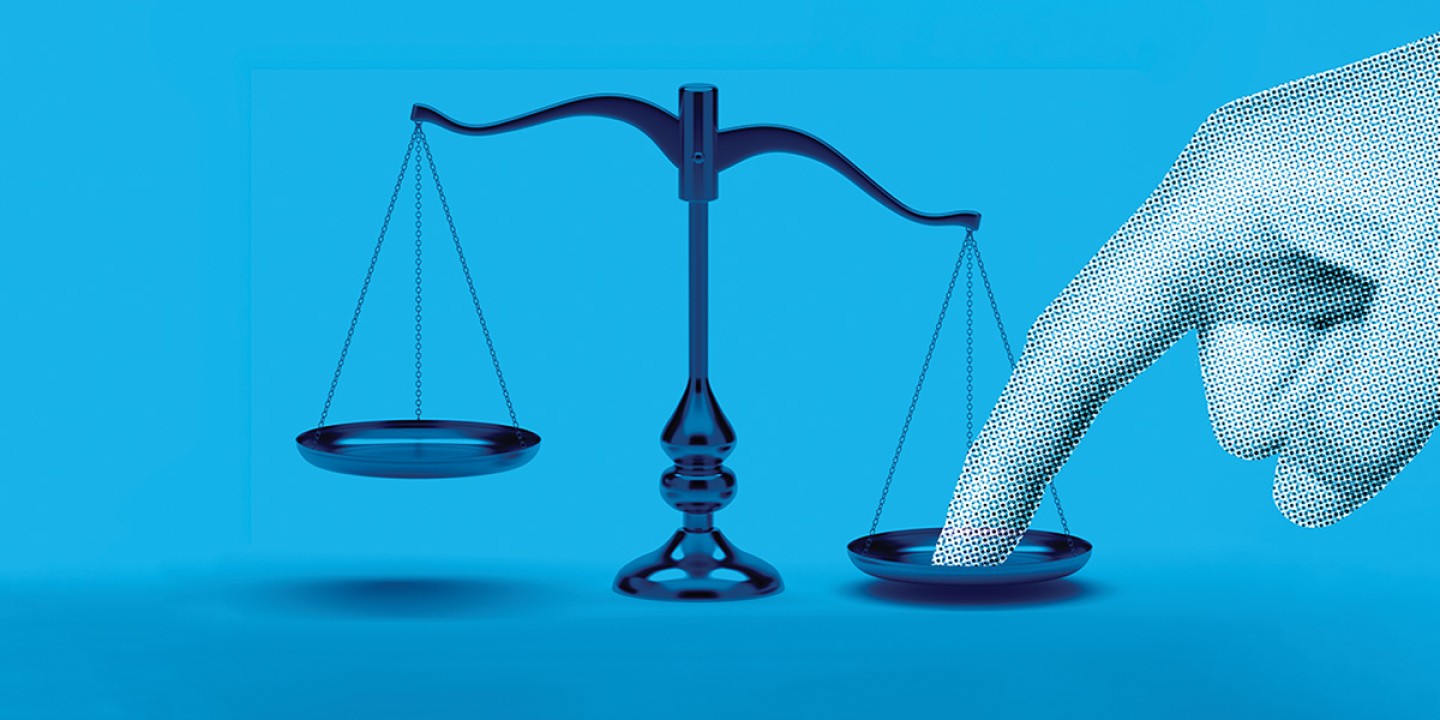The Rittenhouse verdict and the twisting of natural law
If a protest for equal rights is a threatening provocation, then answering that threat with violence is merely self-defense.

On November 19, Kyle Rittenhouse was acquitted of all charges for killing Joseph Rosenbaum and Anthony Huber and wounding Gaige Grosskreutz in Kenosha, Wisconsin, during the unrest following the police shooting of Jacob Blake last year. Within hours of the verdict, the Heritage Foundation held a question-and-answer session on YouTube, which it promoted with the line, “What is YOUR natural right to self-defense?”
This is not the only attempt to frame what happened in Kenosha through the lens of natural law. As someone who thinks of himself as a natural-law lawyer, I find this troubling. These responses are just another example of how natural law and its expression in the Anglo-American legal tradition—common law—has been deformed by its adaptation to support White supremacy.
Read our latest issue or browse back issues.
At its core, the right to self-defense in common law was based on one’s right to use the proportionate amount of force necessary to keep oneself from harm. The amount of force used could be neither disproportionate to the threat faced nor greater than that needed to maintain one’s safety. Properly understood, self-defense is not a license to kill; it’s a justification for using protective force that may have the unfortunate result of a homicide.
The application was so narrow during the time of King Henry III (1216–1272) that the law would not even allow a defendant to be acquitted on a homicide charge in such a situation. Rather, the defendant would be convicted but then allowed to seek a pardon from the king based on a finding of self-defense. By the time of King Edward I (1272–1307), the jury was the one responsible for reporting the verdict of self-defense to the king—but it still was not allowed to acquit on this basis.
This doctrine also included a key limitation: the person arguing self-defense could not be the one who caused the escalation that led to the need to use deadly force. Simply put, you could not escalate the conflict and then claim a right to defend yourself. This is the corollary of the self-defense doctrine: if the person you killed was defending themselves first, then their right to self-defense takes priority over yours, because you are the aggressor.
On paper, much of this same logic still applies in our written laws today. For example, under section 939.48(2) of the Wisconsin Statutes, the justification of self-defense is not available to a defendant who “engages in unlawful conduct of a type likely to provoke others to attack him” or a “person who provokes an attack, whether by lawful or unlawful conduct with intent to use such an attack as an excuse to cause death or great bodily harm.”
But these venerable doctrines—rooted in Christian legal development and meant to enshrine the value of human life and deter the resort to lethal force—have been twisted by White supremacy to serve a whole new need: to justify the use of force against those seeking to vindicate their equal rights. In the mind of the White supremacist, the protest for equal rights is a threatening provocation. Thus, anyone who answers that threat with violence cannot be an aggressor and has the right of self-defense intact.
A person who views a protest for equal rights as a rightful and just assembly, however, will see someone arriving from outside the community with weapons as a provocation, meant to escalate a conflict into deadly violence.
This is a contrast we see within the church as well. Just last year, Catholic priest James Altman sought to diminish lynching as merely capital punishment improperly carried out. In his telling, the White communities behind lynching were simply reacting with a kind of collective self-defense to Black men having the audacity to walk free. That freedom, in the mind of White supremacy, is itself an act of aggression that diminishes culpability for—or even justifies—the White violence that follows.
In Kenosha, Blake, a Black man, was the victim of excessive police violence. Other citizens, exercising their natural and First Amendment rights to defend Blake and themselves from further police violence, staged protests. Rittenhouse, a resident of Illinois, then appeared on the scene with a gun, which he used to kill two protesters and injure another. A worldview that allows for a self-defense acquittal in this case is one that must consider it reasonable for a boy to appear, armed, at the scene of (and in opposition to) a protest against police brutality. It is a worldview that views those advocating for equal rights as unjust aggressors. It is a worldview that knows the peace being disturbed is that of White supremacy.
Sadly, this is the worldview that was crafted this month, in court and in conservative media.
It is this fundamental disagreement, on who constitutes the aggressor in the wider social context, that is driving the different reactions we are seeing to this case. It is why some people can see Rittenhouse as a hero, a shining example of self-defense. And it is why so many Black people and their allies are heartbroken, recognizing what the acquittal reveals about the broader legal and social landscape: to be free and Black and to support Black freedom are still acts of aggression in America.
In common law, freedom and life were so sacred that an individual had a right to resist arrest—even lawful arrest. Unlawful arrest could always be resisted, while lawful arrest could be resisted if it involved excessive force. The police were not free to place their authority or mission above human life. That changed in the 1950s and ’60s, however, just as African Americans began a new push for freedom to exist and move in public space—often leading to arrest.
Many of the same people who see self-defense in the Rittenhouse case have argued that Black people deserve to be shot when exercising their ancient right in common and natural law to resist arrest, a right rooted in the right to self-defense. These (usually White) people tend to think of themselves as conservatives, and they may even think they are upholding natural law and Anglo-American common law traditions. But the truth is the opposite.
Ultimately, the Rittenhouse case has nothing to do with the natural right to self-defense or venerable common law traditions. It has everything to do with what you believe is the proper social order of the United States. And it is a sad state of affairs when a venerable legal tradition is manipulated and destroyed to maintain White supremacy. Rather than uphold the rule of law, I fear this verdict has continued this country’s relativistic descent into a social reality cut off completely from those legal and philosophical traditions and rights that really are the birthright of all Americans.
A version of this article appears in the print edition under the title “A natural, narrow right." This article was originally published in the Black Catholic Messenger, an online media outlet by and for African American Catholics. Used by permission.





